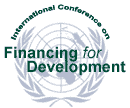
Department of Public Information - News and Media Services Division - New York
18-22 March 2002
 |
International
Conference on Financing for Development Department of Public Information - News and Media Services Division - New York |
|
| Monterrey, NL, Mexico 18-22 March 2002 |
22 March 2002 | |
|
|
|
PRESS BRIEFING BY CONFERENCE SPOKESWOMAN
She said that the Conference, which had revived international interest in global economic issues and commitment to provide the means to attack poverty worldwide, had achieved an unprecedented level of international cooperation by bringing together 51 presidents and prime ministers, as well as finance and foreign ministers, business and civil society leaders. Even before the Conference opened on Monday, an intergovernmental consensus had been reached on issues that had divided the North and South for decades, the Spokeswoman said. And the Monterrey spirit was strengthened just days before the opening by pledges to increase official development assistance (ODA) by tens of billions of dollars from the United States and the European Union. Ms. Markham said the pledges would build confidence that commitment was genuine on the other five areas of the Monterrey Consensus -- trade, debt, investment, national resource mobilization, and international systemic coordination. She said that many speakers during the Conference pointed to the link with terrorism, which could not be fought with weapons alone. Poverty and inequalities could lead to despair and provide a breeding ground for violence, crime, corruption and terrorism. There were very frank exchanges, especially at the round tables, side events, and the NGO Forum that moved the discussions forward. It was the first United Nations conference
to have the active collaboration and participation of the World Bank,
the International Monetary Fund (IMF) and the World Trade Organization
(WTO), she said. He said the document concluded with a commitment to strengthen the United Nations as the main organization to revamp the international financial system, working with the World Bank, the IMF and the WTO. The call for the United Nations to carry the process forward was very clear. The United Nations Economic and Social Council, the General Assembly and multilateralism, in general, would also be strengthened. Responding to a journalist's question, Ms. Markham said no country had refused to sign the Consensus as it had been adopted by acclamation, and required no signature. (more
Asked for a reaction to President George W. Bush's statement that he would set up a team to select aid recipients, Mr. de Rojas said the United States President was entirely entitled to carry through whatever initiatives he had announced. He told another correspondent that no revisions had been or would be made to the Monterrey Consensus document. States had committed to go beyond the Consensus. Monterrey was a point of departure, not arrival. It was a catalyst for many further actions. Asked why the summit had adopted the Consensus this morning instead this evening as earlier announced, Mr. de Rojas said that even though the Consensus had been adopted, the report of the Conference and those of the round tables would not be adopted until tonight. The round tables were important because it was the first time they had been held in a format that included civil society. In reply to another question, Ms. Markham said President Vicente Fox of Mexico would hold his press conference today at 4:10 p.m. President Jean-Bertrand Aristide of Haiti would hold another at 5:30 p.m. Mr. de Rojas told another journalist that the plenary was scheduled to end at 8 p.m. Asked if the fact that not all countries were in the plenary when the Consensus document was adopted meant that some were opposed, he said that any delegation with reservations would have let the Secretariat know. What was the implementation procedure for the Consensus and who would monitor it? another correspondent asked. Mr. de Rojas replied that the Conference had given the Secretary-General that responsibility, together with the World Bank, the IMF and the WTO, as well as the United Nations Conference on Trade and Development (UNCTAD), the United Nations Development Programme (UNDP), and others. At the next meeting of the Economic and Social Council in April, the issues would be taken up. Ms. Markham told another journalist that the heads of State retreat had started at 11 a.m. and would end at 4 p.m. * *** * Press Releases Conference News |